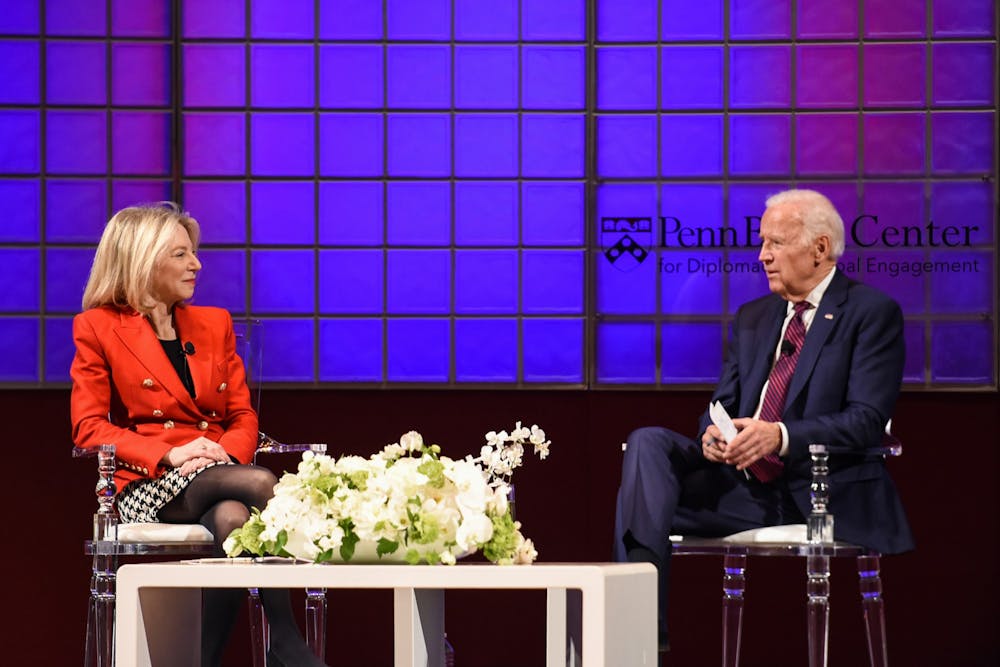
2021 brought former Penn Presidential Practice Professor Joe Biden's first actions as president and Penn President Amy Gutmann's nomination for U.S. ambassador to Germany.
Credit: Ananya Chandra2020 was a year impacted by the start of the pandemic and a contentious presidential election. In 2021, members of the Penn community reckoned with the aftermath of 1968 Wharton graduate Donald Trump's presidency while also adjusting to the initial actions taken by the new administration.
As campus reopened and students returned to Locust Walk, in-person life allowed Penn's political clubs to restart in-person programming and voter mobilization efforts for both local and national elections.
The Daily Pennsylvanian's coverage followed how the University and its students and faculty members reacted to this year's biggest moments in politics — ranging from the Capitol insurrection and Trump's subsequent impeachment to former Penn Presidential Practice Professor Joe Biden's first actions in office.
Jan. 7 — After a right-wing, insurrectionary mob stormed the United States Capitol, Penn President Amy Gutmann and Provost Wendell Pritchett condemned the assault in a written statement.
The University’s statement denounced the “dangerous propagation of falsehoods and disproven allegations” of a fraudulent election that Trump and his supporters had claimed, but it did not make any mention of the former president or acknowledge the University’s connection to the Penn alumnus.
Following the insurrection on Jan. 6, Penn alumni called on the University to revoke Trump’s degree.
Jan. 13 — Trump became the first president to be impeached twice after the 232 members of the House of Representatives passed articles of impeachment — charging Trump with "incitement of insurrection.”
Trump was impeached for the first time in December 2019 after being charged with abuse of power and obstruction of Congress. He was accused of soliciting election assistance from the Ukrainian federal government to investigate then-presidential candidate Joe Biden.
Jan. 20 — Joe Biden was sworn in as the nation’s 46th president. Kamala Harris became the first woman, Black American, and Asian American to serve as vice president when she was sworn in during the ceremony.
Biden’s address focused on unifying the country, as he promised that he would be “a president for all Americans,” a common theme throughout his campaign — in light of the COVID-19 crisis and increased political polarization.
As the Biden-Harris administration took office, it brought over 10 Penn graduates and affiliates to serve in the White House. 2019 Penn Law School graduate Ashley Williams became the first Black woman to be deputy director of Oval Office operations, while 1991 College graduate Michael Hochman was appointed deputy staff secretary.
Feb. 13 — After being impeached for the second time, former president Donald Trump was acquitted again by the Senate. Seven Senate Republicans voted ‘guilty’ along with Democrats to make the 57-43 vote the most bipartisan margin in favor of conviction in American history.
March 8 — Following through on campaign promises, Biden signed an “Executive Order on Guaranteeing an Educational Environment Free from Discrimination on the Basis of Sex, Including Sexual Orientation or Gender Identity."
Penn students leaders told the DP that they hope Biden would be able to deliver much-needed reforms of current regulations but questioned how long the process might take before actual policy changes are made. They also expressed hopes that the University would provide further support to victims of sexual assault.
July 2 — Penn President Amy Gutmann was officially nominated by Biden to serve as the U.S. ambassador to Germany.
Hours after the White House's press release, Gutmann wrote in an email to the Penn community that she planned to continue in her position as president either until June 30, 2022, as originally planned, or until whenever the Senate confirms her ambassadorship. Penn professors largely agreed that Gutmann has the capability to rebuild relations with Germany, while some students were wary about change in University leadership.
July 21 — Weeks later, Biden tapped former Board of Trustees Chair and 1981 Penn Law graduate David Cohen to be the U.S. ambassador to Canada.
Sept. 27 — In anticipation of National Voter Registration Day, Penn’s political clubs began to transition towards in-person strategies and initiatives for the first time in over a year this past September.
With hopes to boost student turnout, Penn Leads the Vote, a nonpartisan, student-run program, and Penn Democrats both told the DP about their goals to regularly have voter registration tables set up across campus. By election day, Penn Dems said that they were able to register over 350 voters during the semester.
Nov. 3 — Nearly 400 ballots were cast in Penn’s two campus polling locations during this year's general election. Both Houston Hall’s Bodek Lounge and the ARCH Building’s room 108 were open from 7 a.m. to 8 p.m. for registered voters. Students reported that the voting process was quick and easy to navigate.
Students who voted on campus predominantly voted for the Democratic nominee, according to results posted outside the polling locations. The Democratic incumbents, Larry Krasner and Rebecca Rhynhart, were reelected to serve as Philadelphia’s district attorney and city controller, respectively.
The Daily Pennsylvanian is an independent, student-run newspaper. Please consider making a donation to support the coverage that shapes the University. Your generosity ensures a future of strong journalism at Penn.
Donate







